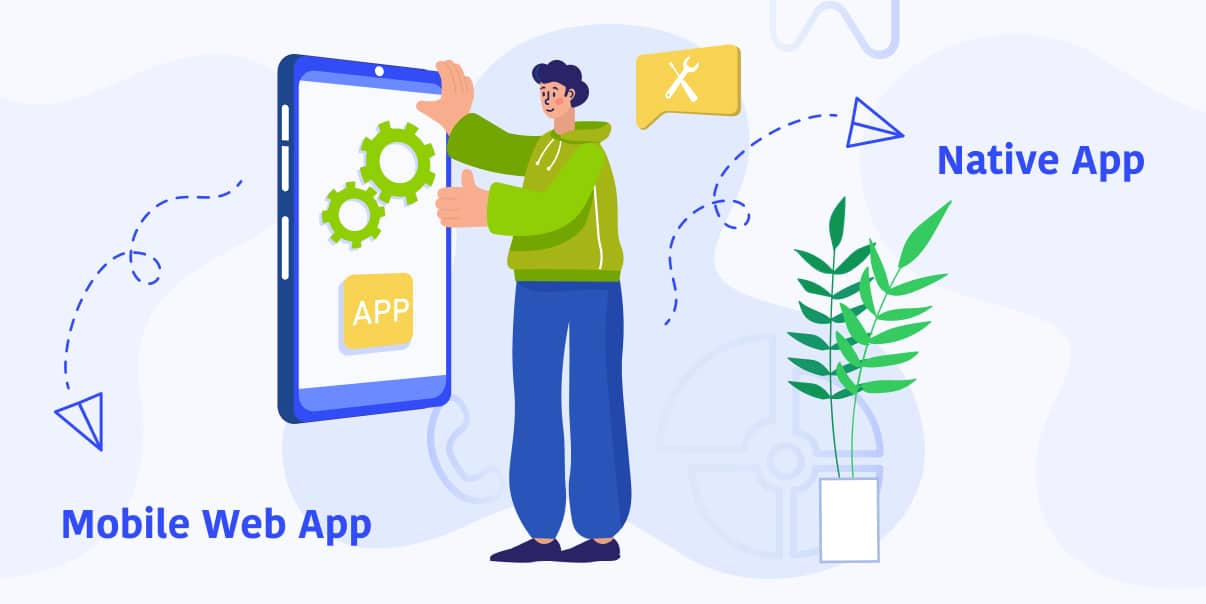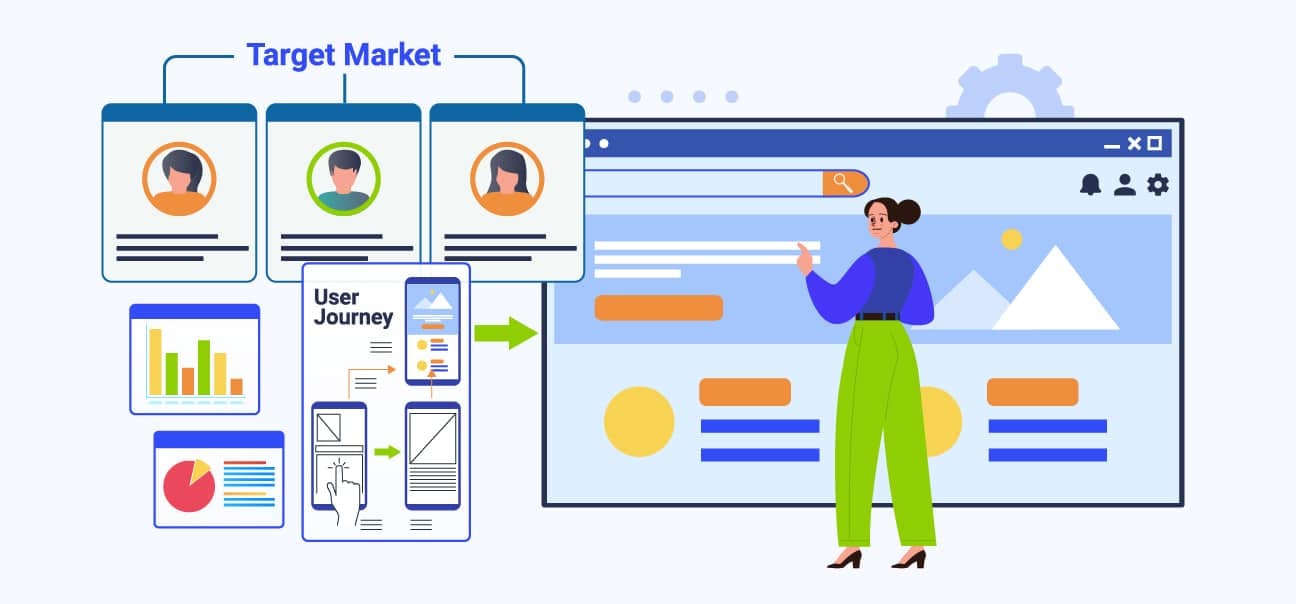Mobile Web App vs. Native App: A Head-to-Head Comparison

Nowadays, the convenience of a mobile application has become almost essential for many businesses. And they have become a vital part of people’s lives. In this blog, we will compare native and web-based apps to help you understand the pros and cons of each option to make an informed decision on your next project.
Read on to get a head-to-head comparison of these two popular types of mobile apps.
What Is a Mobile App?
A mobile application is a software program that runs on smartphones and tablets. These applications range from simple games to complex business solutions. You can find them on major mobile application stores like App Store and Google Play.
Different Types of Mobile Apps
Mobile apps come in various forms, and you can use them for different purposes. There are multiple types of mobile apps, but the most popular ones are the following:
Native Apps
These apps are built specifically for one platform, like iOS or Android. Native apps typically provide the best user experience but require coding knowledge and expertise to develop them. They are also more expensive than web apps.
Web Apps
You can access these mobile web apps through a browser on any mobile device, regardless of platform. Web-based apps are cheaper and easier to develop. Still, they do not provide the same user experience as a native app.
Hybrid Apps
Hybrid apps are a combination of web and native mobile applications. They use web technologies such as HTML, CSS, and JavaScript but wrapped in a native app shell for different platforms, such as iOS and Android. These apps allow developers to create one application that can run on iOS and Android devices. Thus, it saves businesses time and money. But a hybrid app may lack the user experience found in a native app.
Progressive Web Apps (PWAs)
PWAs are websites that act a lot like an app on your phone. Instead of downloading and installing an app, they let you access the same features in your mobile browser. Progressive web apps enjoy some features that a mobile web browser offers. Moreover, a progressive web app can do all sorts of things, including sending you notifications, working offline, and even running faster than other websites.
Advantages of Native Mobile Apps
Native apps offer a great user experience because they are designed specifically for one platform. They often provide smoother navigation, better performance, and more features like push notifications, accelerometers, and cameras. Also, native apps offer better security than web-based ones.
Know more about the advantages of native mobile applications below:
Better performance and Speed
Native mobile apps provide snappier performance and faster loading times. Since the app runs on the device’s operating system, they are more optimized for the best performance. Additionally, you can perform operations faster and with fewer data requests to the server.
Access to Device Features and Hardware
Another advantage of native mobile apps is that they have access to a range of features and hardware unavailable to non-native apps. For example, you can use GPS tracking, which allows you to take pictures or record sound, access files on the device, and provide location-based services. All these features make native mobile applications much more potent than other types of programs.
Improved User Experience and Engagement
You can download native mobile applications from app stores and install them directly into your device. These mobile apps provide an improved user experience, making them easier to use than a website on the phone. And this is what makes them more engaging for users because they can quickly find what they are looking for and perform tasks with fewer clicks.
Ability to Work Offline
One of the best things about native mobile applications is that you can use them offline. They work even when you are in areas with poor Internet connectivity or no connection at all. As a result, you can continue using native apps without interruption.
Advantages of Web Apps
Web apps offer advantages over traditional software, such as lower cost and excellent compatibility. They are also more secure and easier to update. With these benefits, it’s no wonder that more businesses are turning to web applications for their computing needs.
Here are the following advantages of custom web apps:
Cross-platform Compatibility
Web-based apps are compatible with multiple browsers, unlike native apps, which require different versions for each operating system. It means web-based apps can reach a wider audience, as they are available on all platforms.
Faster Development Process
Web-based apps are easier to develop and deploy than native applications. They also require fewer upfront costs, as you only need a mobile device’s web browser for testing. Moreover, you can quickly update them with new features and bug fixes. You only need to update the code once, and it will be automatically available to all users.
No Need for App Store Approval
Unlike native apps, web-based apps do not need to go through the tedious app store approval process. Web apps allow you to launch and iterate quickly, as you do not have to wait for approval or build multiple versions.
Easier to Update and Maintain
Web-based apps use fewer resources as they run on mobile browsers. It makes them easier to maintain since you only need to fix the issue with the code, and you can apply it across all mobile devices.
Disadvantages of Native Mobile Apps
Native app development can be a great way to create engaging, interactive experiences for your users. But there are some downsides to consider when building with native technology. Let’s look at some of the disadvantages of these types of apps.
Longer Development Time and Higher Cost
One of the main disadvantages of native mobile apps is that they take longer to develop and cost more money than web-based apps. The native app development process is longer as you need to code separately for each platform, which can be tedious. In addition, developers must keep up with the latest operating system updates to ensure compatibility. The longer it takes to develop a mobile app, the more expensive it costs.
Limited to a Single Platform
When you want an app available to multiple platforms, you need to develop it for each of them, which is quite expensive and time-consuming. Native mobile apps are limited to a single platform. You can only use them on the device they were mainly made for, unlike web-based apps, which can run on any device with an Internet connection. If you want an iPhone user and an Android user to use the same app, you must create two separate versions.
Dependence on App Stores for Distribution
Another disadvantage of native apps is their dependence on app stores for distribution. Apple App Store and Google Play Store control the app store, making it challenging to get your app approved or listed in their stores. Also, you may need to pay some fees for submitting your app to an app store.
Potential for Lack of Discoverability
Lastly, native mobile apps may be tough to discover since they are among thousands of other apps in the application store. There’s no guarantee that users will find your app and use it. You need to invest in advertising and marketing to promote your app and make it stand out from the competition.
Disadvantages of Web Apps
Although you can access web-based apps across multiple platforms, they often have slower loading times and require a reliable internet connection. Additionally, data stored in web-based apps are typically not as secure as in a native mobile app. Thus, below are the disadvantages of web apps:
Limited Access to Device Features and Hardware
Unlike native apps, web apps cannot access many device features and hardware. And this can be a significant limitation when you want to build more advanced functionalities, like GPS tracking or accelerometers, which are not available in web-based apps.
Dependence on Internet Connection
A mobile web app requires an Internet connection to work correctly. Therefore, if the device you’re using doesn’t have access to the web, your app won’t function properly. It can be inconvenient because there are times when you can’t access a reliable web connection, especially when you need it.
Potential for Slower Performance
Another major disadvantage of web-based applications is that they take longer to load than native apps. Since web apps need to communicate with other computers over the Internet before they can display information on your screen, this slows down the app’s performance. Moreover, this can negatively affect the user experience and make your app less engaging.
Limited Offline Functionality
Another downside of web applications is that you can’t use them offline. It will help if you have a reliable Internet connection for this app. That means you can only access your web app if you are in an area with good Internet connectivity.
When to Use Native Mobile Apps?
Native mobile app development is best for businesses needing hardware features, such as GPS tracking, camera, or accelerometers. It is also essential when you require smooth navigation and better performance from your app. Additionally, if you want a secure app with offline functionality, then native apps are the way to go. They can work offline, so you do not have to worry about having a poor or no connection.
When to Use Web Apps?
Web-based apps are ideal for businesses that need an app compatible with different platforms. They are better when you need to quickly create something or provide access to many users without them needing to download anything. Moreover, progressive web apps are a brilliant choice to save money on development costs since they only require one code set. Web apps offer better discoverability since they do not need to go through the tedious app store approval process.
Conclusion
Ultimately, this mobile web app vs. native app guide helps you decide which type of app is perfect for you. Both native and web mobile apps have their own set of advantages and disadvantages. Understanding the differences between them is essential before deciding on your next project.
If you need better performance, security, or offline functionality, you should go for a native app. On the other hand, if you need an app compatible with multiple mobile platforms and can quickly develop and deploy, mobile web apps are the way to go. Indeed, the choice of a native or web-based mobile application depends on your specific needs. So be sure to understand what you need before deciding which app works best for your business.
We’re BIT Studios!
At BIT Studios we specialize in designing, building, shipping, and scaling beautiful, usable products with blazing-fast efficiency



